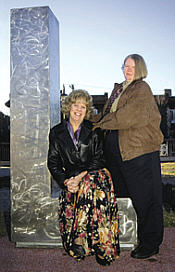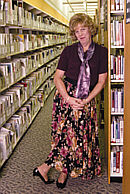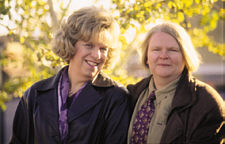


by ellen lansky
photos by siddiqi ray


Let's begin with the bathroom, a contested site in discussions about gender expression and human rights. When I was in high school, the Equal Rights Amendment (ERA) had been sent to the states for ratification. One of the big debates in my sociology class concerned the possible effects of ERA. The language of ERA was simple, and most of the effects seemed simply positive to me and to most other people in my class.
However, there was a general panic when an ERA opponent trotted out the standard anti-ERA rhetoric, one aspect of which was that women would be drafted into the army and put into combat units. The argument was that women toting weapons on the front lines of wars was an inhumane and unthinkable notion, though nobody seemed to have any trouble thinking about putting young men on the front lines and instructing them to kill or be killed.
The other anti-ERA threat was even more discomfiting--nay, horrifying: the specter of "unisex" restrooms. This was the late 1970s, and by that time, most people--even the people who lived where I did in Overland Park, KS--a conservative, upwardly mobile suburb of Kansas City--had accustomed themselves to unisex hairstyles and unisex clothes. People of all genders wore Levis and had shag haircuts. But unisex bathrooms? It was just too much. The ERA was defeated by a landslide in Kansas, and it ultimately vanished from the nation's classroom discussions and political scene.
Now, as the Human Rights Act has been enacted in Minnesota and the millennium approaches, a person can find and use unisex bathrooms all over the map: in coffee shops, in gas stations, in public libraries. I bet there are even a few back in Overland Park. Here's a typical scenario: A person who expresses masculinity goes in the door marked "Restroom" and does his business. Next in line is a person who expresses femininity. When the guy comes out, she goes in the same door and does her business. No problem.
Maybe not. At Southwest High School in Minneapolis, the "bathroom issue" is a big, big problem for one particular teacher, Carla Cruzan. Recently, Cruzan filed a complaint with the Minnesota Human Rights Department because she felt that Debra Davis--transgender activist, executive director of the Gender Education Center in Maple Grove, and longtime librarian and Media Center teacher at Southwest--should not use the women's restroom. Ostensibly, Cruzan's problem was that Davis uses the women's restroom. Cruzan's complaint, according to Constance Hope, Davis's lawyer and partner, was dismissed as having "no probable cause."
"Tom Pritchard from the Minnesota Family Council wrote to the Minneapolis Police Department and asked them to arrest Debra for using the 'wrong' bathroom,'" Hope says. "In their various complaints, they are misstating the law in two ways. They are alluding to a Minneapolis city ordinance about window-peeping, which makes it unlawful to enter the opposite-gender bathroom to peep at people.
And while there is a narrow bathroom exemption in the Human Rights Act, it doesn't apply to Debra. But somehow, this woman [Cruzan] and these folks from the extreme right think it's all right for a transgender person to be asked to use a different bathroom." The complaint is so specious that it is almost laughable, particularly the "peeping" charge. Furthermore, Cruzan's real problem really has nothing at all to do with the bathroom and who uses it; her problem is her own fear and loathing of differently gendered people.
The Real Peeper
"This person is spreading fear about transgendered or differently gendered people," Davis observes. "She's trying to make people think that we are people who will come into the bathroom and do terrible things. It affects the whole atmosphere of the building. For me, the threat of arrest was scary. You don't know what the cops are going to do."
"Yes," Hope adds. "We didn't know what would happen. If the police arrested Debra, would they let her get her purse? And where would they put her? Would they put her in a holding cell with men, which would be completely inappropriate, or with women?"
"Luckily," Davis says, "the cops laughed."
Davis gives a nervous laugh herself as she tells this story. When she talks and laughs about her ongoing dilemma, two scenes from Boys Don't Cry come to mind. If you've seen the film or you know the story, then you know the fear you feel for Brandon Teena when he is pulled over by the cops and has to produce a driver's license. Second, you know the shame you feel for/with Brandon Teena when he is arrested and has to explain to his girlfriend Lana why he is incarcerated with women. Unlike Brandon Teena, however, Davis has excellent community support as well as the protection of the law, the police, and her school.
Librarian and Lightning Rod
"I've become a focal point for the extreme right and their attack on the Human Rights Act," Davis says. "But there are so many gender-transition stories that don't even make the news. The difference, I suppose, is that I'm successfully living my life as a differently gendered person, and I work with young people. I was surprised by the acceptance at my school. When I came out, it was not a big hullabaloo. A student came up to me, and she looked at me, and she said, 'You know, you're the same person. You go, girl.' Now, I usually don't allow students to speak to me in that way, but that time it was OK because she was respectful.
"I'm the only out transgender librarian in the country in public education, and the school district has never wavered. My principal is great; my colleagues and the students, too. On the day I came out, there were 300 phone calls to the Minnesota School Board's voice mail. Three hundred. And all of them were positive. My transition was a success because of allies--the GLBT community and all those other friends who are out there.
"It's true that I'm the only out transgender librarian in the country in public education, but I don't want to be in the media. I made a commitment to the district to keep a low profile with the mainstream media. But the school district has never wavered."
Davis's transition and coming out in a public school are a milestone, a victory for human rights in this state. Her emergence as a transgender activist also makes her a major force for education on transgender issues. Although she's maintained her commitment to keep a low profile with the mainstream media, Davis has provided ongoing educational services to media members and operations that have been, in the past, insensitive and/or hostile to transgender people and transgender issues.
"I'm the executive director of the Gender Education Center," Davis explains. "It's a nonprofit organization, and since 1991, I have done probably 40 to 60 training and speaking engagements per year. I've gone in as a consultant in workplaces, trained management, and answered questions about transgender people and the transition and coming-out process.
"I've visited organizations all over the Midwest, and I've been a featured speaker at Morris Pride, at Pride in Minneapolis, and in dozens of workshops. I've also been on KFAI radio, 'T Time with Debra Davis.'
"The GEC has a fabulous board of directors, and we operate on a shoestring--basically next to nothing. But it keeps me going. This work has been a big part of my survival, even when I wasn't out as Debra."
Last spring, Davis participated in Cross Fire: A Journey Through Gender Mayhem, a project that Eleanor Savage coordinated at Intermedia Arts to foster, encourage, and stimulate discussions, and to get people to think critically about gender. On a panel about gender issues in the media, Davis appeared with, among others, Rosalind Bentley of the Star Tribune.
Bentley and Davis discussed their alliance, which had come about because Bentley was willing to learn, and Davis was willing to teach. Bentley has written key feature articles about Davis, and Bentley has also been able to make some inroads in the newsroom. She has taught her colleagues--or at least presented them with information--about the differences between transvestites, transsexuals, and transgender people. Bentley has emphasized and modeled in her writing the necessity to respect a differently gendered person's pronouns of choice.
Much work remains to be done with the mainstream media, however. Davis notes that she established the first television studio in a Minnesota high school, and she has worked professionally in television herself.
"I worked for the North Stars, the Twins, the Vikings, and I used to produce all the Gophers games. I've worked for ESPN, ABC, and NBC as an associate director. I was called to work when the Timberwolves were in the basketball playoffs the weekend I came out, but I haven't been called since. It's freelance work, so I can't claim that they're discriminating. Still, I haven't worked in sports TV since I came out."
A Need for Consciousness-Raising
It may not come as much of a surprise that people in sports television and publications are rather in need of education, general enlightenment, and consciousness-raising where transgender issues are concerned. Last summer, for example, in a Sports Illustrated column called "The Life of Reilly," Rick Reilly wrote a positively befuddled and ultimately telling piece about Nong Toom, a transgender Thai kickboxer. Reilly called his column "He'd Rather Fight and Switch," and he incorrectly tagged Nong Toom as "a transvestite." He used masculine pronouns and a sneering tone.
Reilly's article was mostly a string of ill-conceived and badly expressed comments about Toom's breasts and her personal style. He did not even attempt to hazard a guess why Toom began to cry when officials asked her to weigh in naked, in a room filled with cameramen and photographers.
Granted, Reilly does not expect his readership to ask him to exhibit much ability to think critically about, well, anything, and certainly not about gender. Still, one can take it as a sign of incipient intellectual activity when a guy like Reilly can make an attempt to articulate his fascination, however sophomoric and prurient, with a kickboxer whose body "is broad-shouldered, slim-waisted and ripped like an Olympic swimmer's, only with B cups." The writing is bad, but at least he's writing. If Reilly can write, he can probably read as well. It's possible to educate him.
Certainly, the job of educating the masses of Reillys out there cannot and should not fall upon Davis alone. It is at this point that alliance with the GLBT community comes in, especially with OutFront Minnesota, whose mission is "advocating for the gay, lesbian, bisexual, transgender, and allied communities." Davis is extremely enthusiastic about OutFront's work forging and maintaining alliances and educating.
"OutFront really gave a lot of time to building relationships with the transgender community. OutFront gathers members of the transgender community and keeps people informed. The transgender community is large and diverse, and OutFront helps us feel included as a community. Last spring, there were more people than ever at OutFront's annual lobby day at the Capitol. It was awesome to see all those differently gendered people."
Here, Davis pauses and seizes an educational moment. "I use the term 'differently gendered' because it includes people who might be trans or who might not. The law states that a person can't be discriminated against for 'having a self-image or identity not traditionally associated with one's biological maleness or femaleness.' The law provides for people who are differently gendered. You don't even have to be queer!" Finally, Davis attributes much of her success in living her life as an out transgender person who works with young people to family support, community alliances, and the power of acceptance, respect, and love.
"I graduated from Southwest High School myself, and after that I was the president of my college fraternity. That tells you how hard I tried to be the other person. I just wanted to be like everybody else, but I knew that wasn't going to happen. But I knew I was going to be OK. My parents gave me lots of self-esteem, and I have such wonderful friends and allies.
"It's not how I'd planned my life. I knew I'd be comfortable, but I had no idea this would happen. I really am a reluctant activist. I'm an activist because of who I am."
As Davis sums up, "I just want to live my life as who I am. If I were at a company, my coming out would be no big deal. But for now, it's hard being the center of attention. I have to maintain this constant vigilance and wonder what those people from the extreme right are going to do to make me feel bad. Those people look for reasons why they should hate people, rather than why they should love and respect and accept them."

Even so, the teacher would not relent; she took her complaint to the Equal Employment Opportunity Commission (EEOC). Hope explains that the complaint is now directed at the school, and that the plaintiff aims to sue.
Cruzan is pursuing Debra with such venomous vigor that the real peeper in the case seems to be Cruzan herself. She's the one who can't stop watching the traffic in and out of the women's room. Still, ridiculous as it is, attention must be paid to this complaint and to the threats that accompany it. When somebody threatens to arrest Davis, she has to take that threat seriously.

